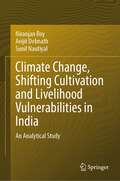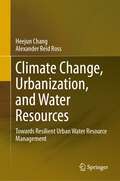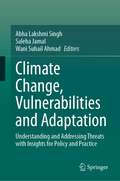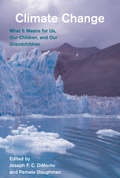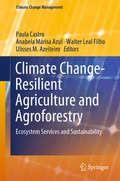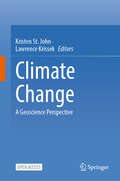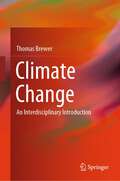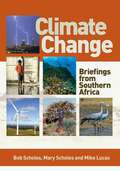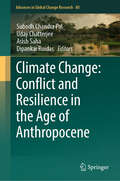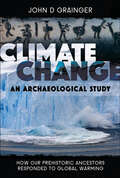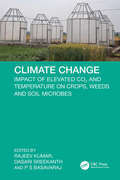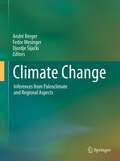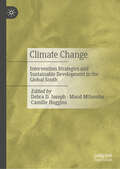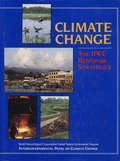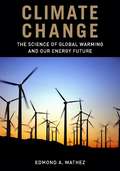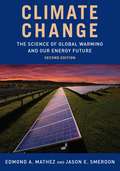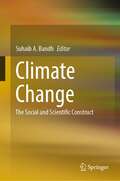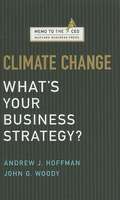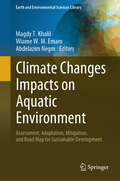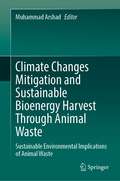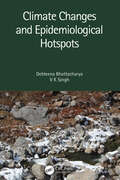- Table View
- List View
Climate Change, Shifting Cultivation and Livelihood Vulnerabilities in India: An Analytical Study
by Sunil Nautiyal Niranjan Roy Avijit DebnathThis book explores how climate change affects households that rely on shifting cultivation and how to assess their vulnerability. This study looks at micro and macro levels in Indian states with indigenous communities practicing shifting cultivation. The micro-level study has been conducted in 52 villages, with 1469 households covering 7067 population in seven states of India in the Northeastern region. The book covers different topics related to climate change, such as its patterns, impact on households and agriculture, forest management, and the role of indigenous knowledge in mitigation. This research is associated with different sectors like shifting agriculture, forestry sector, climate change and rural development etc. and integrated with large respondents and stakeholders through both direct and focus group discussions. Research scholars, climate activists, institutional and non-institutional organisations, people interested in environmental science, social science and policymakers will find this book very relevant.
Climate Change, Urbanization, and Water Resources: Towards Resilient Urban Water Resource Management
by Alexander Reid Ross Heejun ChangThis book discusses resilient urban water resources management in the context of climate change and ongoing urbanization. Twelve cities worldwide representing different climates and growth stages serve as case studies. Using these case cities, this book first identifies the main water issues, including water demand, floods, and droughts, in relation to the historical development of each city, investigates current strategies for dealing with climate-related water hazards, and explores potential adaptive strategies. The authors draw some common lessons by comparing and contrasting these case studies while acknowledging place-based unique adaptation strategies.
Climate Change, Vulnerabilities and Adaptation: Understanding and Addressing Threats with Insights for Policy and Practice
by Saleha Jamal Abha Lakshmi Singh Wani Suhail AhmadThis contributed volume offers a wide variety of cases exploring how humanity can adapt to a changing climate. The volume features a wide variety of contributions from geographers, primarily in India but with plenty of global cases to provide a broad comparative perspective. A primary goal of this book is to bridge the gap from conceptual and data-driven analysis of climate change and adaptation to practical planning approaches and strategies. The book compiles contributions that address human well-being and environmental effects related to climate change, including analysis and modelling of ecosystem services, socio-ecological research and sustainable governance of ecosystems. Results reported in this book are conducive to a better understanding of the climate emergency, climate-related impacts and adaptation and mitigation strategies. The cases here also provide researchers with new examples of applications of vulnerability assessment methods. The volume offers insights regarding vulnerable areas in India, an exploration of how some regions have coped with these issues, and a discussion of the impacts that public policy has had on vulnerability in the regions studied. The focus on vulnerability will assist decision-makers in and outside India in targeting policies aimed at poverty reduction in agricultural communities as well. Though the cases here primarily focus on India, the methodologies presented here are transferable to many other parts of the world.
Climate Change, second edition: What It Means for Us, Our Children, and Our Grandchildren (American and Comparative Environmental Policy)
by Pamela Doughman Joseph F.C. DiMentoAn updated and accessible account of what science knows about climate change, incorporating the latest scientific findings and policy initiatives.Most of us are familiar with the term climate change but few of us understand the science behind it. We don't fully comprehend how climate change will affect us, and for that reason we might not consider it as pressing a concern as, say, housing prices or unemployment. This book explains the scientific knowledge about global climate change clearly and concisely in engaging, nontechnical language, describes how it will affect all of us, and suggests how government, business, and citizens can take action against it.This completely revised and updated edition incorporates the latest scientific research and policy initiatives on climate change. It describes recent major legislative actions, analyzes alternative regulatory tools including new uses of taxes and markets, offers increased coverage of China and other developing nations, discusses the role of social media in communicating about climate change, and provides updated assessments of the effects of climate change.The book first explains the basic scientific facts about climate change and its global impact. It discusses the nature of scientific consensus and the strong consensus of mainstream science on climate change. It then explores policy responses and corporate actions in the United States and the rest of the world, discusses how the communication of climate change information by journalists and others can be improved, and addresses issues of environmental justice—how climate change affects the most vulnerable populations and regions. We can better tackle climate change, this book shows us, if we understand it.
Climate Change, the Indoor Environment, and Health
by The National Academy of SciencesClimate change is not just affecting the outside world around us. It also affects the indoor environment, with consequences for occupant and public health. This report from the Institute of Medicine of the National Academies examines the impact climate change may have on the indoor environment and those health consequences. Written primarily for the Environmental Protection Agency and other federal agencies, it strongly recommends that EPA take the responsibility for informing the public, health professionals, and those in the building industry about potential risks and how to address them. It also recommends change in building codes to account for climate change, evaluation standards for building materials emissions, and more. Annotation ©2011 Book News, Inc. , Portland, OR (booknews. com)
Climate Change-Resilient Agriculture and Agroforestry: Ecosystem Services and Sustainability (Climate Change Management)
by Walter Leal Filho Ulisses M. Azeiteiro Paula Castro Anabela Marisa AzulThis book collects wide-ranging contributions such as case studies, reviews, reports on technological developments, outputs of research/studies, and examples of successful projects, presenting current knowledge and raising awareness to help the agriculture and forestry sectors find solutions for mitigating climate variability and adapting to change. It brings the topic of ecosystem services closer to education and learning, as targeted by the Framework Convention on Climate Change and the Paris Agreement, the 2030 Agenda for Sustainable Development and the EU Biodiversity Strategy to 2020. Climate change and its impacts on agriculture and agroforestry have been observed across the world during the last 50 years. Increasing temperatures, droughts, biotic stresses and the impacts of extreme events have continuously decreased agroforestry systems’ resilience to the effects of climate change. As such, there is a need to adapt farming and agroforestry systems so as to make them better able to handle ever-changing climate conditions, and to preserve habitats and ecosystems services.
Climate Change: A Geoscience Perspective
by Lawrence Krissek Kristen St. JohnThis open access book on climate change assesses past climatic change from a geoscience perspective and directly and effectively addresses common misconceptions on climate and climate change. A geoscience perspective on the multiple causes, rates, and consequences of climate change is essential context to assess modern climate change and our role in it, as well as forecasting future climate conditions. Yet, most textbooks on climate change focus only on the very recent past (e.g., last century), are not sufficiently engaging for non-scientists, or explore paleoclimate science at a level too challenging for introductory students. In addition, a wide range of misconceptions and confusion exists in the general public about climate change. Correcting misconceptions is an essential aspect of education, but educational research has shown that it is challenging to achieve. This textbook includes introductions to each thematic Part, that directly identify relevant misconceptions and refute them with clear, concise messages (i.e., learning goals) that are grounded in science and expanded on in the supporting chapters. Such refutation-style approaches have been shown to be effective at addressing misconceptions. The book offers a clear trajectory of fundamental climate science concepts, which are most beneficially combined to provide a valuable geoscience perspective on the causes, rates, and consequences of climate change. It frames the collection of climate science chapters with impactful, relevant social science context: starting the book with a chapter that explores the reasons behind the disconnect between the scientific and public understanding of climate change, and ending the book with a discussion of the intersection of ethics and climate change. Short topical expansions or excursions are included as &“boxes&” within selected chapters. This book will serve as a basic resource for learning about the lessons that the paleoclimate record offers to evaluate the seriousness of modern and future climate change.
Climate Change: A Multidisciplinary Approach
by William James BurroughsProviding a concise, up-to-date presentation of current knowledge of climate change and its implications for society as a whole, this new edition has been thoroughly updated and extended to include the latest information. The text describes the components of the global climate, considers how the many elements of climate combine to define its behaviour, and reviews how climate change is measured. The author discusses how the causes of climate change can be related to the evidence of change, and modelled to predict future changes. This book is ideally suited for introductory courses in meteorology, oceanography, environmental science, earth science, geography, agriculture and social science. It contains review questions at the end of each chapter to enable readers to monitor their understanding of the materials covered. This book should appeal to an audience with a keen interest in all aspects of the climate change debate.
Climate Change: An Interdisciplinary Introduction
by Thomas BrewerThis textbook introduces and explains the issues around climate change and its mitigation. It includes topics across disciplines and can be used as a single-volume text by students studying a range of subjects. Among the topics included are: ·How to adopt significant mitigation measures now to avoid the most catastrophic long-term consequences of climate change.·Reducing the rates of highly potent, short-lived emissions of methane gas and black carbon particulates—reductions that are necessary to meet the temperature targets of the Paris Agreements.·Implementing wide-ranging adaptation measures to reduce the deaths and economic costs of extreme heat waves, droughts, wildfires, hurricanes, and floods.·Recognizing the unusually rapid warming in the Arctic, which is disrupting weather patterns in the northern hemisphere and currents in the Atlantic Ocean, causing world-wide sea-level rise, and also causing methane leaks in the Arctic region—leaks that could eventually lead to irreversible global warming consequences. Meeting these challenges effectively requires action by both governments and businesses. The book examines the national and local governmental policies—and business practices—that are needed in sector-specific chapters. An objective of the book is to inform readers about specific problems resulting from climate change—and the wide range of potential government policies and business practices, changes in technologies, and changes in public attitudes and actions that can reduce the emissions and otherwise lessen their impacts. Indeed, a central message is that understanding the issues posed by climate change requires no less than an understanding of climate science, micro- and macro-economics, technologies for mitigation and adaptation measures, as well as politics and law at many governmental levels from local to global. The author has included short case studies that illustrate and integrate multiple analytic perspectives. The book is therefore appropriate for students, professionals, and general audiences with wide-ranging interests and backgrounds.
Climate Change: Briefings from Southern Africa
by Robert (Bob) Scholes Mary Scholes Mike LucasClimate change affects us all, but it can be a confusing business. In this book, three scientists with several decades of experience in assessing the potential effects of climate change for the southern African region share their insights. Complex issues are dealt with in plain language, without oversimplification and with attention to accuracy. The material is up-to-date as is possible in such a fast-developing field.Climate Change: Briefings from Southern Africa takes the form of 55 'frequently-asked' questions', each with a brief and clear reply. It is illustrated with colour diagrams and photographs, and examples are tailored to the regional context. The authors' introduction provides an overview of current national and international policies aimed at regulating climate change. The content is divided into four sections, which take the reader through the science of how climate system works; the projected impacts in southern Africa during the twenty-first century; what this means for the South African economy and society; and what can be done to avoid harm. The briefings can be read alone or in sequence.The year 2015 is regarded as a watershed for global climate change action if a global average temperature rise of more than two degrees abbove the pre-Industrial level is to be avoided. This book provides compelling evidence that the impact on agriculture, fisheries, water resources, human health, plants and animals as well as sea levels will be dangerous. However, the book ends on a positive note by offering advice on how the world can avoid such bleak outcomes, while allowing a good life for all.The volume is aimed at interested non-scientists, including business people, decision-makers, ordinary citizens and students
Climate Change: Conflict and Resilience in the Age of Anthropocene (Advances in Global Change Research #80)
by Uday Chatterjee Subodh Chandra Pal Asish Saha Dipankar RuidasThis book illustrates a geospatial technology approach to data mining techniques, data analysis, modelling, risk assessment and visualization and management strategies in many elements of natural and societal hazards. This book delves into cutting-edge techniques based on open-source software and R statistical programming, Google Earth Engine and modelling in modern artificial intelligence techniques, with a particular emphasis on recent trends in data mining techniques and robust modelling in water resource crisis-related hazards. Furthermore, this book also discusses how to manage water resources at various local, regional and international levels while incorporating environmental considerations. This book contains works that address the connection between climate change, extreme events and resilience. These works include those that identify and evaluate policies, quantify the effects of public interventions, climate change on extreme events, describe the decision-making process and its role in modelling for resilience. This book's subjects be of interest to earth and environmental scientists, professionals and authorities. This book focuses at geospatial modelling and climate change management. A relationship between three technologies, including remote sensing (RS), geographic information systems (GIS) and the R programming environment, is acknowledged as particularly effective in this regard. This book, on the other hand, serves as a practical guide to identify the most recent breakthroughs in geospatial and geostatistical approaches and their application in the field of subsurface water-induced hazards throughout the world. This book is specifically designed to serve the community of Undergraduates, Postgraduates and Researchers, Policymakers, Environmentalists, Natural Hazards and Disasters Management, NGOs, Corporate Sectors, Social Scientists, and Government Organizations in the fields of Environmental Sciences, Geography, Hydrology, Natural Hazards, Geospatial Sciences, Remote Sensing & GIS, Agriculture, Crop-Science, Forestry, Soil Science, Agronomy, Humanistic & Social Sciences and so on.
Climate Change: How Our Prehistoric Ancestors Responded to Global Warming
by John D. GraingerHow prehistoric humans coped with the end of the last Ice Age—and catastrophic global warming.Global warming is among the most urgent problems facing the world today. Yet many commentators, and even some scientists, discuss it with reference only to the changing climate of the last century or so. John Grainger takes a longer view and draws on the archaeological evidence to show how our ancestors faced up to the ending of the last Ice Age, arguably a more dramatic climate change crisis than the present one. Ranging from the Paleolithic down to the development of agriculture in the Neolithic, the author shows how human ingenuity and resourcefulness allowed them to adapt to the changing conditions in a variety of ways as the ice sheets retreated and water levels rose. Different strategies, from big game hunting on the ice, nomadic hunter gathering, sedentary foraging, and finally farming, were developed in various regions in response to local conditions as early man colonized the changing world. The human response to climate change was not to try to stop it, but to embrace technology and innovation to cope with it.
Climate Change: How Our Prehistoric Ancestors Responded to Global Warming
by John D. GraingerHow prehistoric humans coped with the end of the last Ice Age—and catastrophic global warming.Global warming is among the most urgent problems facing the world today. Yet many commentators, and even some scientists, discuss it with reference only to the changing climate of the last century or so. John Grainger takes a longer view and draws on the archaeological evidence to show how our ancestors faced up to the ending of the last Ice Age, arguably a more dramatic climate change crisis than the present one. Ranging from the Paleolithic down to the development of agriculture in the Neolithic, the author shows how human ingenuity and resourcefulness allowed them to adapt to the changing conditions in a variety of ways as the ice sheets retreated and water levels rose. Different strategies, from big game hunting on the ice, nomadic hunter gathering, sedentary foraging, and finally farming, were developed in various regions in response to local conditions as early man colonized the changing world. The human response to climate change was not to try to stop it, but to embrace technology and innovation to cope with it.
Climate Change: Impact of Elevated CO2 and Temperature on Crops, Weeds and Soil Microbes
by Rajeev Kumar Dasari Sreekanth P S BasavarajClimate Change: Impact of Elevated CO2 and Temperature on Crops, Weeds and Soil Microbes is a comprehensive and timely volume that explores the profound effects of climate change, specifically elevated CO2 and temperature on plant physiology, crop productivity, weed dynamics, and soil microbial interactions. The primary objective of this book is to provide a detailed and up-to-date overview of the physiological, biochemical, and molecular mechanisms governing crop responses to elevated CO2 and temperature. It also examines the impact on weeds and soil microbial communities, highlighting potential adaptation and mitigation strategies for sustainable agriculture. Readers will gain valuable insights into the latest methodologies and scientific advancements in this field.This volume offers in-depth coverage of key topics, including: Impact of elevated CO2 and temperature on the physiology, yield, and quality of major crops Responses of cereals, pulses, oilseeds, and vegetables to elevated CO2 and temperature Nutritional and quality changes in food crops under climate change scenarios Growth dynamics and physiological responses of weeds under elevated CO2 and temperature Role of soil microbes in plant health and ecosystem stability in changing climates Influence of elevated CO2 and temperature on key metabolic pathways, including photosynthesis, transpiration, redox metabolism, carbon metabolism, and nitrogen metabolism Adaptive mechanisms in crops, including osmo-protectant accumulation, phytohormonal regulation, and mitigation strategies for climate resilience As a significant contribution to climate change and plant science research, this book serves as an essential resource for plant physiologists, agronomists, environmental scientists, soil microbiologists, geneticists, and students. It is a valuable reference for researchers and professionals working on climate adaptation strategies in agriculture and can also be used in coursework for graduate and postgraduate studies.
Climate Change: Inferences from Paleoclimate and Regional Aspects
by André Berger Djordje Sijacki Fedor MesingerExperts in climate and water sciences from Canada, the United States, Brazil, Denmark, Germany, Belgium, France, Serbia, and other European countries and the UNESCO gathered at the Serbian Academy of Sciences and Arts on the occasion of the 130th birthday anniversary of the geophysicist Milutin Milankovitch. The collection of their presentations is opened by an update on the climate situation after the Fourth Assessment Report of the Intergovernmental Panel on Climate Change. Further topics include various issues of paleoclimatology, in particular as it helps reduce uncertainties from which prospects for climate change suffer; ecohydrology and climate change at the watershed scale; and regional climate models, which are discussed in terms of both their improved modeling and their use in studies of a polynya in the Antarctica and expected changes in the Mediterranean region.
Climate Change: Intervention Strategies and Sustainable Development in the Global South
by Camille Huggins Debra D. Joseph Maud MthembuThis book highlights the challenges with respect to climate change in the Global South. It demonstrates what has been happening in varying countries in this geographic location and how sustainable adaptation interventions could be used to alleviate these challenges. Most countries in the Global South are extremely vulnerable and unprepared for the present and future impact of climate change. Some climate change events that are presently plaguing these locations are extreme weather events such as flooding, food insecurity, disasters and droughts. The book provides case studies and interventions that can be a source to others who are seeking to find solutions to these adverse climate change events.
Climate Change: The Ipcc Response Strategies
by Intergovernmental Panel on Climate ChangeClimate Change is the report of Working Group III of the Intergovernmental Panel on Climate Change (IPCC), established in 1988 by the World Meteorological Organization and UNEP to address the threat of global warming on an international scale.
Climate Change: The Science of Global Warming and Our Energy Future
by Edmond A. MathezClimate Change is geared toward a variety of students and general readers who seek the real science behind global warming. Exquisitely illustrated, the text introduces the basic science underlying both the natural progress of climate change and the effect of human activity on the deteriorating health of our planet. Noted expert and author Edmond A. Mathez synthesizes the work of leading scholars in climatology and related fields, and he concludes with an extensive chapter on energy production, anchoring this volume in economic and technological realities and suggesting ways to reduce greenhouse-gas emissions. Climate Change opens with the climate system fundamentals: the workings of the atmosphere and ocean, their chemical interactions via the carbon cycle, and the scientific framework for understanding climate change. Mathez then brings the climate of the past to bear on our present predicament, highlighting the importance of paleoclimatology in understanding the current climate system. Subsequent chapters explore the changes already occurring around us and their implications for the future. In a special feature, Jason E. Smerdon, associate research scientist at Lamont-Doherty Earth Observatory of Columbia University, provides an innovative appendix for students.
Climate Change: The Science of Global Warming and Our Energy Future
by Jason SmerdonThis second edition of Climate Change is an accessible and comprehensive guide to the science behind global warming. Exquisitely illustrated, the text is geared toward students at a variety of levels. Edmond A. Mathez and Jason E. Smerdon provide a broad, informative introduction to the science that underlies our understanding of the climate system and the effects of human activity on the warming of our planet.Mathez and Smerdon describe the roles that the atmosphere and ocean play in our climate, introduce the concept of radiation balance, and explain climate changes that occurred in the past. They also detail the human activities that influence the climate, such as greenhouse gas and aerosol emissions and deforestation, as well as the effects of natural phenomena. Climate Change concludes with a look toward the future, discussing climate model projections, exploring the economic and technological realities of energy production, and presenting a view of the global warming challenge through the lens of risk. Each chapter features profiles of scientists who advanced our understanding of the material discussed. This new edition expands on the first edition’s presentation of scientific concepts, making it ideal for classroom use for a wide swath of undergraduate and masters students with both science and nonscience backgrounds.
Climate Change: The Science of Global Warming and Our Energy Future
by Jason SmerdonClimate Change is geared toward a variety of students and general readers who seek the real science behind global warming. Exquisitely illustrated, the text introduces the basic science underlying both the natural progress of climate change and the effect of human activity on the deteriorating health of our planet. Noted expert and author Edmond A. Mathez synthesizes the work of leading scholars in climatology and related fields, and he concludes with an extensive chapter on energy production, anchoring this volume in economic and technological realities and suggesting ways to reduce greenhouse-gas emissions.Climate Change opens with the climate system fundamentals: the workings of the atmosphere and ocean, their chemical interactions via the carbon cycle, and the scientific framework for understanding climate change. Mathez then brings the climate of the past to bear on our present predicament, highlighting the importance of paleoclimatology in understanding the current climate system. Subsequent chapters explore the changes already occurring around us and their implications for the future. In a special feature, Jason E. Smerdon, associate research scientist at Lamont-Doherty Earth Observatory of Columbia University, provides an innovative appendix for students.
Climate Change: The Social and Scientific Construct
by Suhaib A. BandhBeginning in the second half of the twentieth century, the impacts of climate change have been fierce, causing loss of human life and irreparable destruction to natural and man-made infrastructure in many parts of the world.The difference between climate change now and in the past is that of sudden and disproportionate disruption of the natural energy dynamics by the changing consumption patterns of billions of human beings who have polluted terrestrial and aquatic ecosystems. The picture that emerges from the exhaustive analysis of international data drawn from the most reliable sources indicates that we have possibly gained access to the gateway of extinction and it is time that we take corrective steps immediately.Global climate change is further altering our relationship with the environment, modifying relatively stable climatic factors and making them uncertain, unpredictable, and threatening. Changes in land use and an increasing demand for water resources due to climate change have affected the capacity of ecosystems to sustain food production, ensure the supply of freshwater resources, provide ecosystem services, and promote rural multi-functionality. Ensuring food production does not just depend on increasing water efficiency, promoting climate resilient crop production, or reducing land-use competition for urbanization but also on a more suitable and stable climate as the changes in climatic factors like precipitation, temperature, radiation, evaporation, and wind bring about some major shifts in global food supplies. According to Special Report on Emission Scenarios (SRES), focused on greenhouse gas emissions projections, and Representative Concentration Pathways (RCPs) conducted by the Intergovernmental Panel on Climate Change (IPCC), climate change increases the risk of simultaneous crop failures (including corn, rice, legumes, and vegetables) if irrigation systems are not fully adapted to water stress situations. A changing climate could have many adverse impacts on other sectors of our environment. This book offers concrete, up-to-date, and appropriate study cum research material for students, researchers, academicians and policymakers. It will be of a greater interest to students and researchers in the field of environmental science, agriculture science, agronomy, and sustainable development.
Climate Change: What's Your Business Strategy?
by Andrew J. Hoffman John G. WoodyBelieve or not, climate change is one of the most pressing challenges facing the world today. Most of all, it is quickly becoming a crucial business issue. But how will you and your company respond? You need fast and reliable advice from the world's foremost experts. Climate Change delivers just that: four strategies from two MBA professors with broad and deep experience with environmental issues. Climate Change gives you a first-hand look at how world-class thinkers would react to this pressing issue if they were in your shoes. From our new Memo to the CEO series - solutions-focused advice from today's leading practitioners.
Climate Changes Impacts on Aquatic Environment: Assessment, Adaptation, Mitigation, and Road Map for Sustainable Development (Earth and Environmental Sciences Library)
by Abdelazim Negm Magdy T. Khalil Wiame W. M. EmamThis book provides a detailed and a clear picture about the impact of climate changes on all aspects of our lives. The book will shed some lights on the challenges and obstacles that agricultural development in different countries are going through regarding the dimensions of food security due to climate change. The vulnerability of agricultural system will be discussed and the methods to adapt to some impacts of climate change will be projected. Some authors will focus on how Global Climate change may directly or indirectly affect the water cycle and, consequently, the quantity and quality of water resources needed to meet human and environmental demands. It can lead to recurrent floods and droughts, rising sea water levels with serious effect on coastal aquifers, and extreme water temperatures that can exacerbate many forms of water pollution. Water supply reliability, health, agriculture, energy, biodiversity and aquatic ecosystems will all suffer the impact of such challenges.The demand for water to meet these needs is also affected by climate change. Evidently, adopting a holistic water-energy-food nexus approach, while promoting the use of non-conventional water resources, can better support a transition to sustainability, a fact that should appeal to national interest and encourage governments, the private sector and civil society to engage. The results of the Climate changes conference; COP 27 that held in Sharm El-Sheikh in 2022, will be discussed in some chapters to illustrate the several efforts that have been taken by some countries to adapt to climate changes, including continuous breeding program to produce crops adapted to higher temperature, salinity, shorter in life cycle, and better in post-harvest and shelf life. The efforts to improve on farm water management and reduce water consumption in agriculture to increase water productivity will be discussed. Saving water from agriculture will be associated with saving fertilizers to control GHG emissions and could allow allocating water for land reclamation. Some Chapters aim at highlighting the impact of climate change on water resources depending on a clear understanding of how climate, fresh water, and biophysical and socio-economic systems are interconnected at the global and regional scales, meanwhile presenting state-of-the-art technologies and innovative/holistic solutions for adaptation and mitigation measures, and increasing the resilience of vulnerable communities to climate change, with the ultimate goal of achieving sustainable development towards “the future we want” while “leaving no one behind.
Climate Changes Mitigation and Sustainable Bioenergy Harvest Through Animal Waste: Sustainable Environmental Implications of Animal Waste
by Muhammad ArshadThe valuable characteristics of animal waste materials in terms of climatic change impact and bioenergy production are discussed in this book. Reutilization of such wastes for bioenergy harvest is the prime focus; the great need for future animal waste recycling is also depicted.Major topics discussed are types of livestock waste – poultry and dairy, methods and management of waste utilization and storage, application of animal waste in bioenergy production, economics of waste utilization, novel disposable techniques, circular bioeconomy, pollution, and water quality. Furthermore, utilization of animal waste for resource conservation and environmental protection is discussed, such as potential materials for green biochemicals. Resource recovery can, therefore, forestall the shortage of natural resources and, at the same time, can greatly reduce waste-disposal problems and energy crises. Many alternatives to waste disposal, either currently available or under study, focus on the recovery of material or energy. In a world of diminishing resources and increasing needs, each opportunity for the recycling of animal waste materials has been examined.This book significantly contributes toward climate change mitigation through better environmental solutions. A better understanding of animal waste recycling to mitigate climate changes has been portrayed in order to generate discussions among researchers and administrators. Environmental implications of animal waste are of prime importance in climate change scenario. Such wastes also harbor zoonotic pathogens that are transported in the environment.Finally, it has been tried out to collect ideas and experience in multiple aspects of animal waste management for climate change mitigation and bioenergy harvest.
Climate Changes and Epidemiological Hotspots
by V K Singh Debleena BhattacharyaClimatic change plays an integral part in planetary health and is amongst the most important global environmental aspect that has an impact on human health. The linkage between the environmental change and disease dynamics has been highlighted in recent times and hence, emphasis on environmental sustainability to reduce future epidemics. Present book focusses on the relationship between climatic change and epidemiological factors with an approach to reduce the global hotspots. The climatic changes relevant to periods of activity and variations in geographical distribution is addressed including interconnection of sustainability, population growth and environmental change. Features: Covers environmental management and waste to resource for future. Includes guidelines for analysis, assessment, and interventions for waste management. Discusses environmental impediments in the way of healthcare inclusions. Impresses upon the importance of clinical epidemiology to detect, treat, control, and prevent the spread of non-communicable diseases globally. Provides insights for the future health hazards that can be administered at the insignificant stage. This book aims at Graduate Students, Researchers, Professionals and Health Care Professionals in environmental engineering, waste management, climate change, and healthcare.
